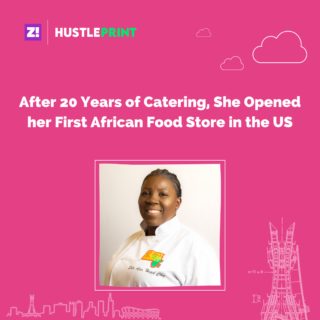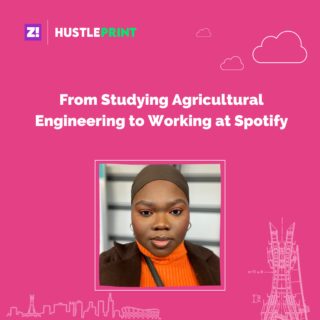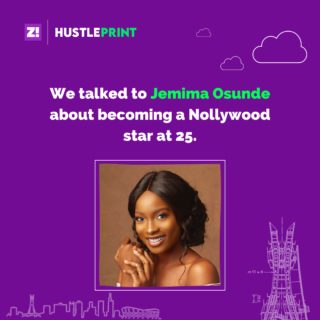Every two weeks, Zikoko will share the hustle stories of Nigerians making it big in and out of the country. With each story, we’ll ask one crucial question in several ways: “How you do am?”
Getting a job at Microsoft before graduating? Chisom, you have to show us the way
I promise it wasn’t a big deal. I was just aware that there’s a lot more to life than school.
What does that mean?
While I was invested in keeping my grades up, I realised as a computer scientist, it’s not all about books. In the real world, people want to know if you can code, programme or build something. As a student, I just focused on that.
Your degree didn’t prepare you for the real world?
Every computer science student knows we’re taught mainly theory. On some occasions, we’d use software, but on most, we learnt about coding on a whiteboard or paper.
Coding on paper?
No shade to Nigerian universities, but I didn’t make a lot out of what I learnt there. Still, it was an important experience for my journey.
How?
I met the guy who got me into coding in my second year. There was an innovation hub on campus and science students liked to hang out there. On one of the random days I stopped by, I met a tech bro designing an android application.
It wasn’t unusual to see people coding, but it looked like he was designing a mobile application on his laptop. I was intrigued and asked what he was up to. That was the first time I’d heard anyone talk about building apps on Google Play Store.
Two years in computer science and none of that came up in class?
All I’d done was code on paper and attempt to teach myself on a laptop. But that guy was developing real apps for phones. That was an upgrade I knew I needed, so I asked him to teach me.
Sweet. So the journey to tech sis, how did that go?
I had some programming knowledge from joining Aptech in Calabar in 2018, but it was still hard to keep up with the tools for building the apps. I got a hang of it eventually when I started taking tutorials online. The tutorial videos had practice projects at the end that made it possible for me to build a portfolio, which was instrumental to my transition to software engineering.
What’s the difference between being a computer scientist and a software engineer?
The difference is in the practical aspect. Software engineers design and ship products by the minute. While a computer scientist is more theoretical; it’s like a bigger umbrella.
What major thing helped you to prepare for the role?
The projects at the end of each tutorial. After a year, I wanted to apply for internships, but I didn’t have a resume. When I looked up samples, there were sections for work experience and personal projects. And I didn’t have anything relevant to include. That’s a big issue when there are a million other people trying to get the same job you want.
I get you. What was the first experience you got as a student?
Building my first phone application in 300 level. I wasn’t sure what to build initially. But it was easier to replicate a more culture-specific version of the programme I’d been taught. That’s how I made Igbò Amáká, a language-teaching app.
How well did Igbò Amáká do to be relevant enough against a million other people?
The most important aspect was getting the application to work. Companies want to know you can actually build the app. And I did. By the time I graduated, I’d built a second application designed to help visually-impaired people send emails. That was pretty impressive to talk about during job interviews.
When did you start applying?
Before the end of my final exams in early 2020. I wanted to get a software engineering job and start immediately after school. So I was submitting 30 to 50 applications a day — I literally flooded the internet with my resume, applying for jobs. But I was more interested in getting into the Big Tech companies — Facebook, Amazon, Apple, Microsoft or Google.
You weren’t even thinking about Nigeria at all?
I was at first. While applying and going through interviews, I realised that junior and internship roles are like “mid-level” roles in Nigerian companies. They always asked if I had work experience. So I changed plans and focused on the big tech companies. My thinking was they have more capacity to train people with little experience.
Fair enough
But even with the projects I’d done, I wasn’t getting hired at any of the companies I actually wanted. They were looking for someone with more experience than I had.
The first interview I failed was Bloomberg’s. Then the aptitude tests for Google, Facebook and Microsoft followed. That’s how companies kept dropping me. It made me feel like it wasn’t a project problem anymore.
Then what was it?
I had the skills. But the recruiters needed more than me being able to build applications. Every entry-level engineer can code. The question was how well-grounded I was as a developer without any work experience.
Did I have any published articles? Any volunteer experience or a portfolio website to showcase? That’s the difference between startups and bigger companies like Google. They don’t just care about your work experience as a student. Skills that demonstrate being good at communication and problem-solving are what matter.
How about the aptitude tests you failed? What were you missing?
Everything around data structures and algorithms. When you combine them with strong soft skills like communication, problem-solving, teamwork and collaboration, they can be the real access card to bigger organisations.
Interesting. What do data structures and algorithms mean?
It’s a course on its own. Data structures and algorithms test your knowledge of logic, coding and communication. You get to answer technical questions using your preferred coding language, and the tests can be complex. They’re the most common questions international organisations ask.
What helped you pass them?
A book called Cracking the Coding Interviews. It’s a bible for data structures and algorithms. And courses on Educative helped because they were more structured.
How long after your first attempt at Microsoft did you try again?
Six months. I felt ready to apply again in August 2020. And I’d been applying to other companies as well. Every interview was my practice leading up to my final interview with Microsoft.
Clearly, things worked out
Yeah. I got a call back in December and an offer letter in January 2021 to resume after school in November.
You were doing all this in your final year. How did you manage it?
Haha. Time management. I spent most of my early mornings doing some work before school. I’d get back quite early to work on my final project, revise what I was taught and get right back to work again.
It was a rollercoaster, but it was worth it.
Best in studies
It’s funny how I was offered an internship as a technical analyst at Bank of America (BOA) just a month before the Microsoft offer. I applied during my six-month period of preparing for interviews.
That’s wild
The euphoria was intense. I was going to school, running a three-month internship and looking forward to resuming at the Microsoft office in Lagos.
What do you think changed with the Microsoft interview? How did you scale through the first stage this time?
I felt ready for the test. Every other failed attempt made me ready. That’s the only way to explain it.
Give us some inside gist. What were the other phases of the interview?
After the coding test, there’s a phone interview with four phases. Each one lasted 45 minutes, followed by two non-technical interviews. My manager interviewed me and asked questions like what I’d do if my team didn’t understand a task. Or how I’d approach a problem I couldn’t solve even after asking for help and googling for answers. The focus was behavioural questions.
I scaled through, and now I’m here.
And how has your experience at Microsoft been so far?
It’s been more than a year, and my time at Microsoft has taken me from a university graduate with no experience to a seasoned software engineer. I still have a lot to learn, but the future looks really bright.
If you could go back, what would you have done differently?
I would start earlier. I’ve met colleagues who started off with an undergraduate internship at Google. And I wish I didn’t doubt opportunities like that were possible.
What’s one place to start looking out for the right opportunities?
I get asked a lot of questions like this, so I’ve created a database of resources for interviewing and getting started in tech. And my Twitter page is dedicated to helping more people get into big tech companies.
What does the next level look like for your career?
Gaining more technical skills. The world is moving towards innovation, and I’d always want to be at the peak of things. Fortunately, I’m at a company that has the same vision I do.
I’d also love to explore leadership roles in tech, managing engineering teams and products. I know I have to keep upskilling — taking courses and staying current with tech trends — leveraging my network and building a solid brand for myself to make this happen. And I plan to make it all happen.
Hustleprint stories drop every two weeks on Tuesdays at 12 p.m. WAT, and Hustleprint guides will drop in the interim weeks.
So you can follow each drop, Hustleprint will be published in our money newsletter.




